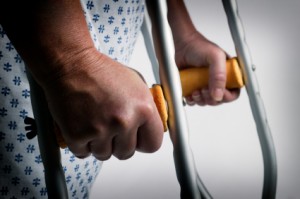One of the more frustrating and overwhelming questions you may find yourself asking after a car accident is: who is going to pay my medical bills? The costs quickly add up. And when you are hurt after an accident, you don’t want to have to be further burdened by worrying. Asking yourself this question now will prepare you if you or any of your loved ones are injured in an accident.
Table of Contents
Your First Defense: Personal Injury Protection (PIP)
When you first sign up for auto insurance, part of that insurance will be specifically dedicated to covering medical costs. This insurance extension, called Personal Injury Protection (PIP) is required of every car insurance policy. In addition to covering medical costs, PIP may also sometimes cover lost wages and additional damages. PIP, also known as “No-Fault Insurance,” offers a minimum payment of $3,000 for medical bill costs for every person that is injured in the accident, regardless of who caused the accident. Even though this is the minimum amount required, in most cases it is also the maximum that insurance companies offer. If you did not cause the accident, you don’t have to worry about this causing your insurance premium to increase. You also do not have to worry about paying the $3,000 back to the insurance company because they will be reimbursed by the at-fault driver’s insurance.
What if My PIP Coverage Isn’t Enough?
Oftentimes the $3,000 covered under Personal Injury Protection is not enough pay for the total medical bill costs. The total medical bill can also be unknown for a while after the accident due to lingering injuries or injuries that are discovered later. Insurance companies understand this and will immediately offer a fixed amount to settle. This settlement offer is often under the amount that is adequately needed to address your medical costs. Do not take this settlement until you have consulted with an attorney! If you and your lawyer decide to open a legal case, you have other options available to you to help pay for your medical costs until the case settles.
Option 1: Health Insurance
Your first option is to go to your health insurance plan. Your medical provider can forward the bills directly to the health insurance company to avoid them being sent to a collection company. Be aware that you may have to pay co-pays or deductibles up front depending on your insurance. When the case settles, however, you will be reimbursed for those payments with the money from your settlement.
Option 2: Set Up a Lien
This option is available to you when you hire an attorney to help you after you have been in an accident. In this case a lien, or agreement, is made between you, your medical provider and your attorney. It ensures that you do not have to complete your medical payments until after the case has been settled. The attorney agrees to pay the medical provider before you receive any settlement funds and you agree to pay the balance of the bills regardless of the outcome of the case. Not all medical providers accept liens, but if they do, this is a nice option because it buys you time and gives you a better idea of the extent of your injuries and the amount that needs to be paid to help you recover from those injuries.
Option 3: Pay Up Front
A third option is to pay for your medical expenses up front with cash or through monthly installments. Obviously this option is not available to everyone. The benefit of being able to do this is that it potentially allows you a discount (depending on the medical provider and their policy) and it also keeps the account current so you do not have to worry about the bills being left unpaid. Unpaid accounts that are sent to a collections agency will negatively affect your credit and give you a bigger headache than you already have.
Option 4: Let it Go
If none of the aforementioned options are available to you, your last resort may be just to let the payments go unpaid and subsequently sent to collections. Once they are sent to collections, you may have the chance to set up a lien with the collection company (although many collection companies do not offer this option, some do). If the collection company does offer to arrange a lien with you, it will likely still record the overdue payment and your credit report will still be negatively affected.
Moral of the Story: Plan in Advance
It is important to be thinking about this question now. If available to you, it is recommended that you get an insurance plan that you are comfortable with and that gives you ample coverage and protection in case you are injured in an accident and the money runs out. Whatever you do, after you have been in an accident, be sure to 1.) take the time to get a complete and thorough medical diagnosis of your injuries, 2.) do not accept the initial settlement from the at-fault insurance company, and 3.) consider consulting a personal injury attorney!

